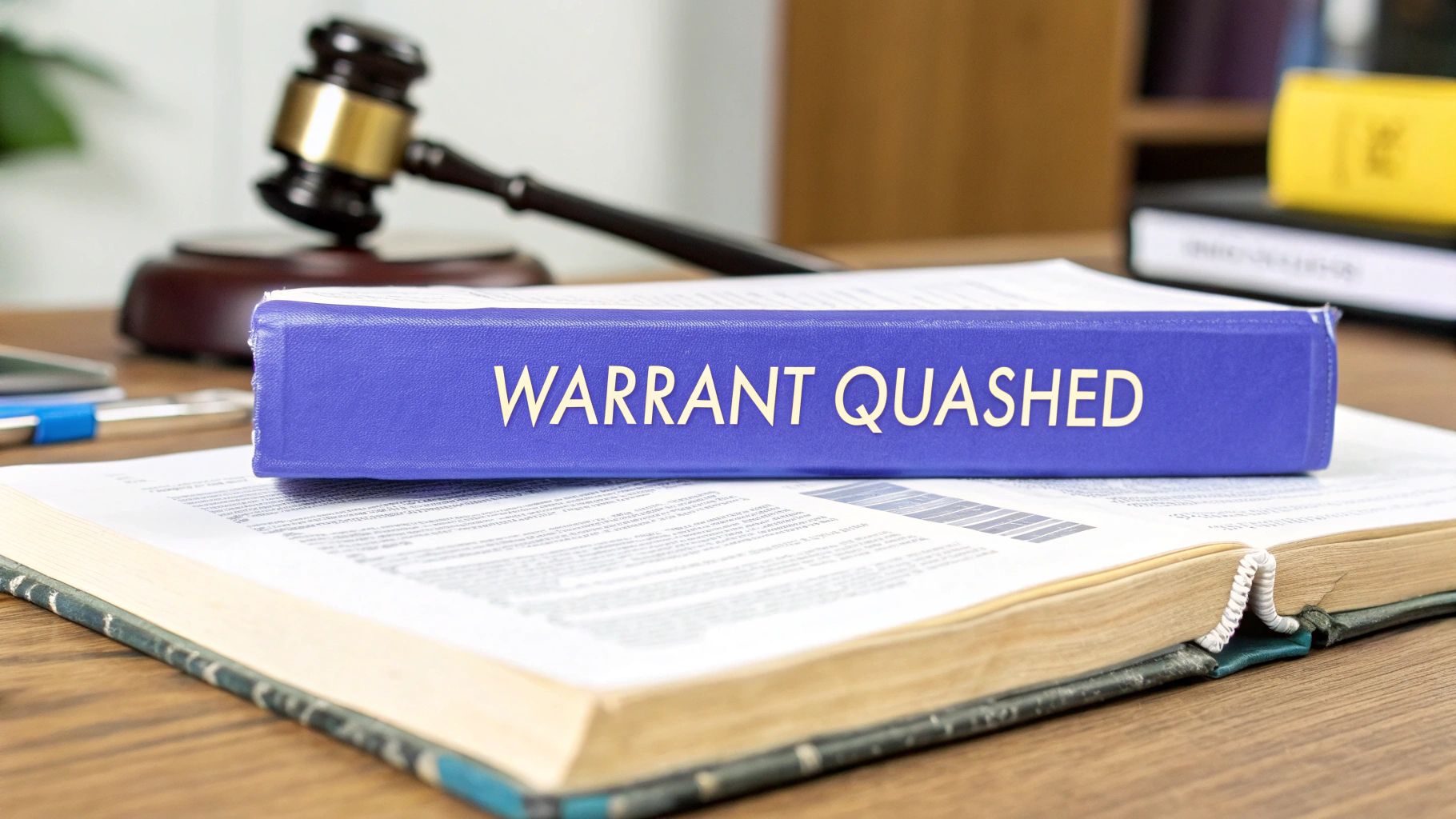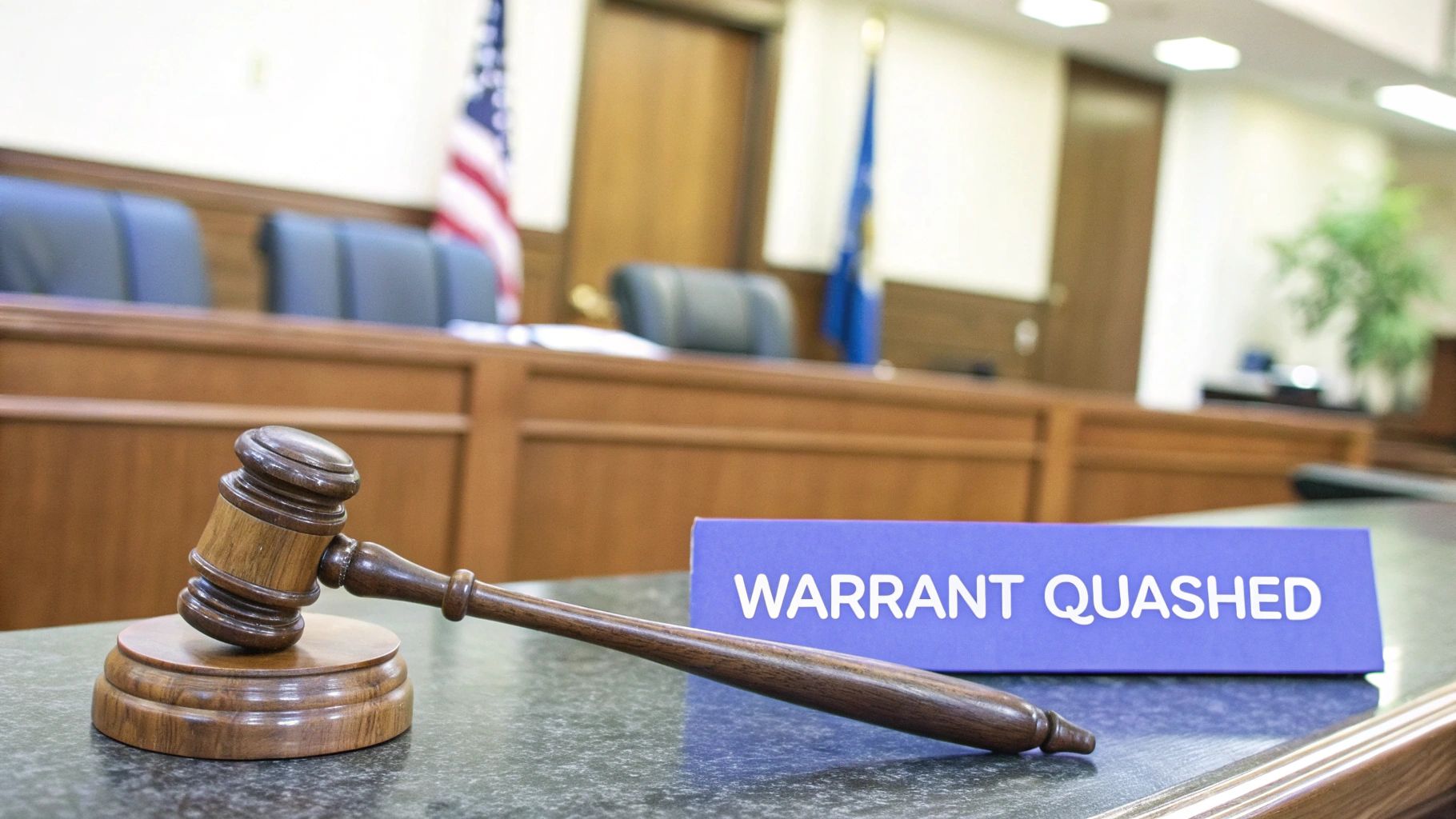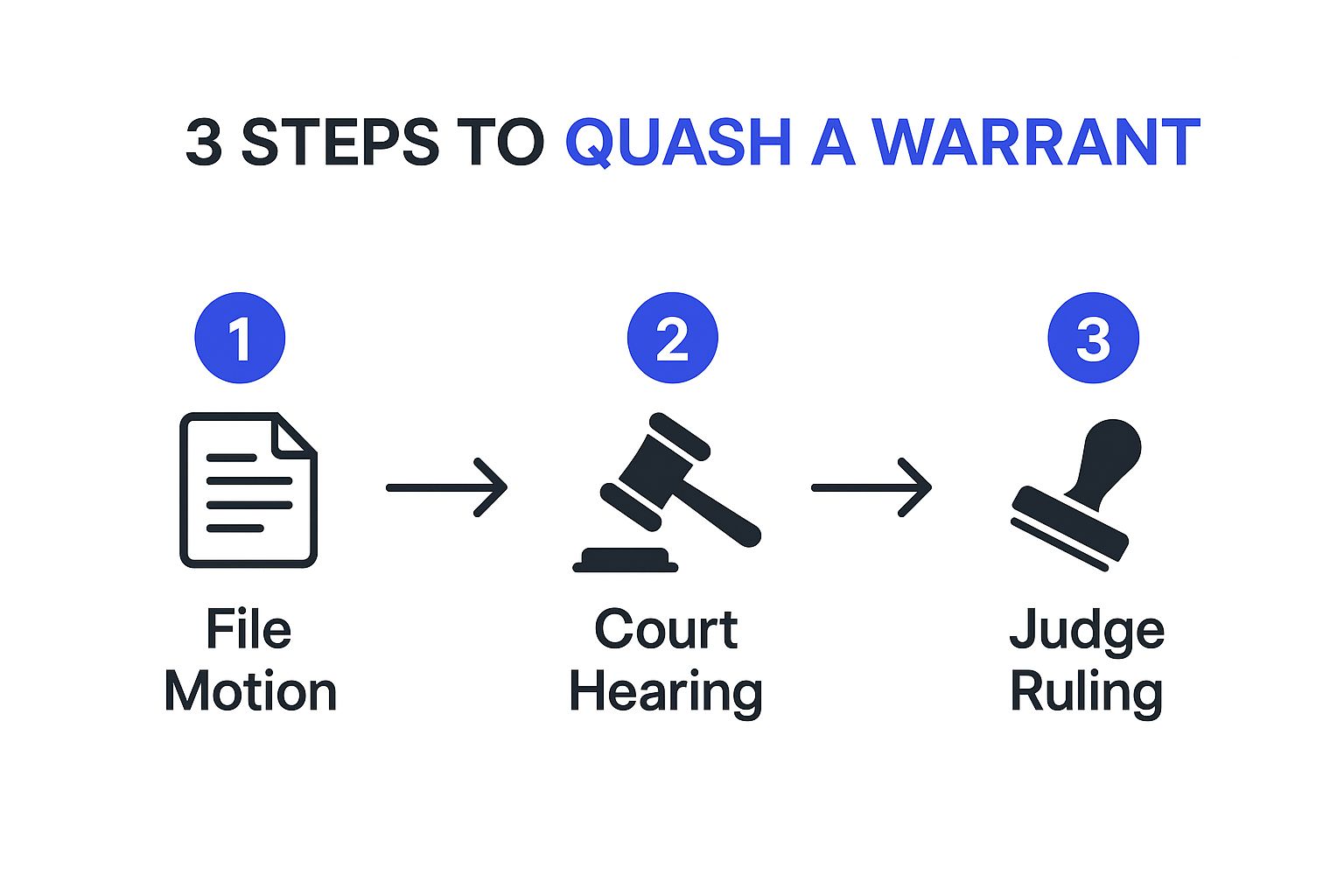
When Courts Say 'This Order Never Should Have Existed'
 Picture a city approving a permit to build a new skyscraper. As the construction crew starts work, an inspector finds a critical flaw: the permit was granted using bad engineering data. The city doesn't just halt construction; it revokes the permit entirely, declaring it was never valid. This is what happens in court when a warrant is quashed. It’s not just paused or withdrawn—it's legally nullified, as though it never had any authority.
Picture a city approving a permit to build a new skyscraper. As the construction crew starts work, an inspector finds a critical flaw: the permit was granted using bad engineering data. The city doesn't just halt construction; it revokes the permit entirely, declaring it was never valid. This is what happens in court when a warrant is quashed. It’s not just paused or withdrawn—it's legally nullified, as though it never had any authority.
This legal action is a fundamental safeguard against the misuse of power. When a court quashes a warrant, it confirms that the initial justification for a search or arrest was deeply flawed, violating basic constitutional rights. The effects of this decision are both immediate and powerful.
The Motion That Starts It All
This process isn't automatic; it's initiated when a defense attorney files a motion to quash. This formal request argues that the warrant was issued or carried out improperly. The most common challenges involve search warrants and arrest warrants, each governed by its own strict legal standards. You can find out more about how these motions are used at Shouse Law Group.
Beyond the Legal Definition
To understand what does warrant quashed mean is to see a core principle of our justice system in action: official orders are not absolute if they fail to meet legal requirements. This idea is a single piece in the larger puzzle of legal terminology. For those trying to make sense of this complex world, our guide on legal jargon explained can offer some much-needed clarity. Ultimately, quashing a warrant resets the board, protecting individual freedoms from potential overreach and ensuring the rules of law are followed.
Inside The Courtroom: How Warrant Challenges Actually Work
Challenging a warrant isn't a single action but a structured legal process. Think of it like a strategic chess match where every move is carefully planned. The goal is to demonstrate to a judge that the warrant has a fundamental flaw and should never have been approved in the first place. This process kicks off when a defense attorney spots a potential weakness and decides to take action.
The Opening Move: Filing the Motion to Quash
The first formal step is filing a motion to quash. This is a legal document submitted to the court that lays out exactly why the warrant is invalid. It’s not enough to simply claim the warrant is unfair; the motion must build a solid legal argument backed by facts. Common arguments include a lack of probable cause, false information in the affidavit used to obtain the warrant, or improper procedures during its execution. This motion officially notifies the court that the warrant's legitimacy is being disputed.
To better understand the legal basis for these challenges, it's helpful to see what kinds of issues are most likely to succeed in court.
| Common Grounds for Warrant Challenge | | :--- | :--- | :--- | | Legal Issue | Description | Success Rate | | Lack of Probable Cause | The evidence presented to the judge was too weak to justify a search. This is the most fundamental challenge. | Moderate | | False Statements in Affidavit | The officer applying for the warrant knowingly or recklessly included false information. The defense must prove the falsehood was intentional. | Low to Moderate | | Improper Execution | The search was conducted outside the scope defined by the warrant (e.g., searching the wrong location or for items not listed). | Moderate to High | | Technical Errors | The warrant contains significant errors, such as the wrong address or an expired date, that make it legally invalid. | Variable |
These are the most common arguments, but success often depends on the specific facts of the case and the strength of the evidence presented by the defense.
The Main Event: The Court Hearing
After the motion is filed, the court typically schedules a hearing. This is where the defense attorney presents their case to the judge, and the prosecution gets a chance to respond. This isn't a full trial but a focused proceeding centered only on the warrant. The defense has the burden of proof, meaning they are responsible for convincing the judge that the warrant is fatally flawed.
Navigating this process requires a firm grasp of legal procedures. For those looking to get more comfortable with legal language, our guide on understanding legal terms for dummies can be a helpful resource.
This infographic simplifies the three-step journey of a warrant challenge.

As the visual shows, the process moves from a formal legal filing to a judicial decision, underscoring that a successful challenge means working through distinct court procedures.
When Law Enforcement Gets It Wrong: Fatal Warrant Flaws
Even with careful police work, warrants can sometimes have fatal legal flaws. Think of it like building a house on a cracked foundation—no matter how strong the walls seem, the whole structure is at risk. In the same way, a warrant built on shaky legal ground won't survive a judge's review. This is a key reason the question "what does warrant quashed mean" often comes up in legal challenges. These flaws usually trace back to violations of basic constitutional rights.
Lack of Probable Cause
The most frequent and serious flaw is a lack of probable cause. A judge is only supposed to issue a warrant when law enforcement provides enough credible evidence to create a "fair probability" that a crime was committed or that evidence of it can be found at a certain place. If the information is too general, comes from an unreliable source, or just doesn't connect the dots, the warrant is built on an insecure foundation. A defense lawyer can attack this by arguing that the affidavit—the sworn statement used to get the warrant—was weak from the very beginning.
Procedural and Constitutional Errors
Beyond probable cause, other mistakes can cause a court to quash a warrant. These issues are often tied directly to the Fourth Amendment, which protects people from unreasonable searches and seizures.
- False Statements: If an officer knowingly includes false information in the affidavit, or does so with a reckless disregard for the truth, the warrant can be thrown out. This is typically challenged with a specific legal tool called a Franks motion.
- Improper Specificity: The warrant must clearly describe the place to be searched and the items or people to be seized. A warrant that's too broad—for example, one that allows a search of "an apartment at 123 Main Street" in a building with multiple units—is considered defective.
- Execution Errors: The way law enforcement carries out the search matters. They must perform the search within the allowed timeframe and only take the items specifically listed in the warrant.
The text of the Fourth Amendment itself lays out these essential rules for all warrants.

This constitutional text highlights the high standard the government must meet before it can intrude on someone's privacy, demanding that warrants be specific and backed by sworn evidence.
The Domino Effect: What Happens After Warrant Dismissal
When a judge quashes a warrant, it sets off a chain reaction, much like pulling a critical block from a Jenga tower. The entire foundation of the prosecution's case can wobble or even collapse. The immediate results are often the most significant, changing the direction of a criminal case and having a direct impact on the defendant's freedom.
Immediate Practical Consequences
The first and most direct outcome is often the release of the defendant. If an arrest warrant is quashed while someone is in jail, they are typically freed. In the same way, a quashed search warrant can result in the prompt return of any seized property. This also applies to finances; for example, if a court quashes a bond and its related warrants, it may order the refund of any money paid to secure release. You can explore more about how this affects defendants on legal forums like Avvo.
The second major consequence is the suppression of evidence due to the exclusionary rule. This legal doctrine stops the prosecution from using any evidence gathered through an illegal search or seizure. Think of it as the "fruit of the poisonous tree"—if the tree (the warrant) is tainted, then so is its fruit (the evidence). This means:
- Physical evidence, such as drugs or weapons discovered in the search, cannot be used in court.
- Any confessions or statements made by the defendant during or after an illegal arrest might be thrown out.
- Any additional evidence found as a result of the initial unlawful search will also likely be excluded.
Long-Term Ripple Effects
Suppressing crucial evidence often leaves prosecutors with a much weaker case. Without their primary proof, they may have no choice but to dismiss the charges entirely. For the defendant, this means the case is closed, and they are no longer facing prosecution. Sometimes, a quashed warrant can even lay the groundwork for a civil lawsuit against the law enforcement agency for violating a person's constitutional rights.
Managing the aftermath involves keeping all court orders and communications organized. For those dealing with numerous legal documents, our guide on legal document management systems can offer helpful strategies. Ultimately, understanding what a quashed warrant means is about recognizing its power to dismantle a legal case from its very core.
Search Warrants Versus Arrest Warrants: Different Games, Different Rules
 While the word "warrant" might sound straightforward, search and arrest warrants are like two different sports with entirely separate rulebooks. Understanding what does warrant quashed mean depends on knowing which game is being played, because the strategies for challenging each are distinct. The legal arguments, required proof, and potential outcomes shift dramatically based on the warrant's purpose.
While the word "warrant" might sound straightforward, search and arrest warrants are like two different sports with entirely separate rulebooks. Understanding what does warrant quashed mean depends on knowing which game is being played, because the strategies for challenging each are distinct. The legal arguments, required proof, and potential outcomes shift dramatically based on the warrant's purpose.
A search warrant gives law enforcement the green light to search a particular place for evidence of a crime. On the other hand, an arrest warrant authorizes them to take a specific person into custody. This core difference is what shapes how a legal challenge unfolds in court.
Different Violations, Different Strategies
Challenges against search warrants almost always revolve around the Fourth Amendment, which protects people from unreasonable searches and seizures. A motion to quash a search warrant typically argues that:
- There was no probable cause to believe criminal evidence would be found at the location.
- The warrant was too vague, failing to name the specific place to search or items to be seized.
- The officer’s affidavit used to get the warrant contained false information.
In contrast, while arrest warrants also need probable cause, the reasons for challenging them often look different. A motion might claim it's a case of mistaken identity, that a failure to appear in court was due to a valid reason (like a medical emergency), or that circumstances have changed so much that the arrest is no longer needed.
The table below breaks down these key distinctions to help clarify how these challenges work in practice.
Search Warrant vs. Arrest Warrant Quashing
Key differences in challenging different types of warrants
| Aspect | Search Warrant | Arrest Warrant |
|---|---|---|
| Primary Goal | To suppress evidence that was gathered illegally. | To stop or reverse an unlawful detention. |
| Common Legal Basis | Fourth Amendment violation; lack of probable cause for the search. | Mistaken identity; procedural mistakes; valid reasons for failure to appear. |
| Key Consequence | Evidence is excluded from trial, which can weaken or dismiss the case. | The defendant is released from custody or avoids being arrested. |
Ultimately, a defense attorney must use a unique playbook for each type of warrant. The approach is carefully tailored to the specific rights, procedures, and goals involved in either protecting property from an illegal search or a person from an unlawful arrest.
Stories From The Legal Trenches: When Warrant Challenges Change Everything
Legal terms can feel abstract until they're connected to real people and real stories. A quashed warrant isn't just a procedural term; it's a critical moment where the justice system's checks and balances protect someone from a wrongful charge. These aren't just courtroom wins—they are powerful examples of our constitutional protections in action.
Imagine a college student facing serious drug charges after a raid on his dorm room. His defense attorney dug into the search warrant and found a major problem: the police’s confidential informant had a known history of giving false tips, a fact left out of the warrant application. The attorney filed a motion to quash, arguing the warrant was based on unreliable information. The judge agreed, the warrant was quashed, and all the evidence from the search was thrown out. With no evidence left, the prosecution dropped all charges, saving the student's entire future.
When Legal Details Make All the Difference
Victories like these often come down to small but crucial details. In one case, a small business owner was arrested for a financial crime he knew he didn't commit. His lawyer discovered the arrest warrant was issued because of a simple clerical error—his name was mixed up with someone else's. A successful motion to quash the warrant led to his immediate release and cleared his name.
Another story involves a family whose home was searched and property seized. The problem? The search happened three days after the warrant had officially expired. A sharp-eyed defense lawyer spotted this procedural mistake, which invalidated the warrant. The family got their property back, and the case against them was dismissed. These examples highlight a key takeaway: understanding what does warrant quashed mean is recognizing its power to uphold justice and keep the system accountable.
Dealing with complicated legal situations requires clarity and confidence. If you're trying to make sense of dense legal documents and need to grasp the important details quickly, Legal Document Simplifier can help you cut through the jargon and spot key obligations and risks.